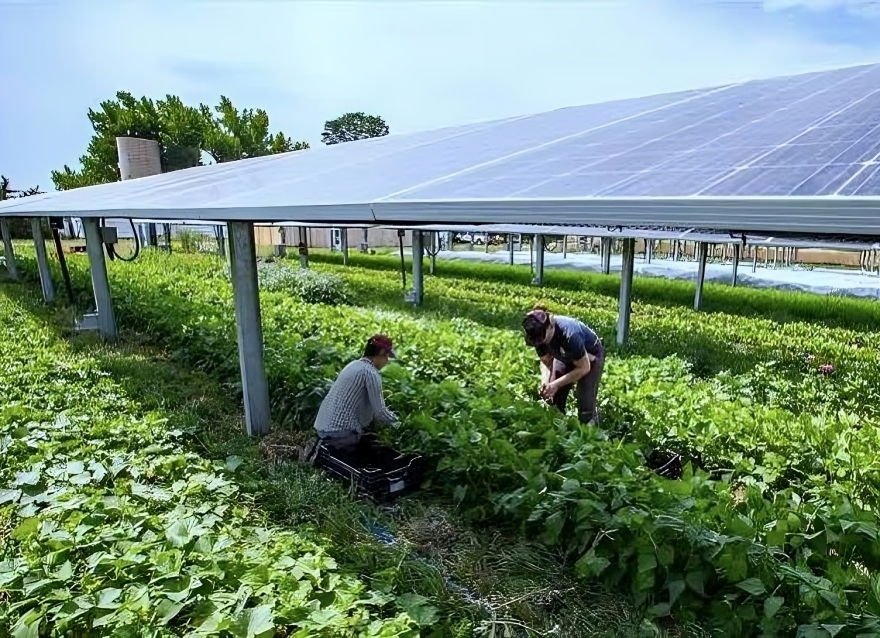KEY POINTS
- Solar-powered mini-grids are transforming Nigerian agriculture and rural economies.
- RMI study reveals these mini-grids can cut electricity production costs by up to 50%.
- The Energizing Agriculture Programme (EAP) has deployed over 260 pieces of equipment across Nigeria.
- Productive Use of Energy (PUE) applications, like cold rooms and mills, significantly boost mini-grid utilization and farmer incomes.
In the heart of Nigeria’s countryside, a revolution is taking shape. Farmers are coming out of the shadows and using the sun not just for growing food, but also for managing agricultural activities. This change is improving lives and changing rural areas for the better in different parts of the country.
A new and innovative report by the clean energy non-profit organization RMI has found that solar-powered mini-grids can help revolutionize agriculture in Nigeria. They are defined as independent systems which incorporate solar panels with battery storage all of which are more than for illumination only. They are fast becoming catalysts of rural economies.
Empowering Communities, One Kilowatt at a Time
An accountant at West Africa’s largest rural power utility says that a single cold room can save 25% of power requirements and also increase energy sales by sixfold. This might look like a fiction of some sort but it is the situation in Nigerian villages presently. The Energizing Agriculture Programme (EAP) is leading this change as it has rolled out more than 260 pieces of equipment across the country.
Uzor Mbamalu, a farmer benefiting from the scheme argues, “We are not merely providing power; we are unlocking possibilities. Having access to stable electricity means we can not only process our crops and preserve them but we can also expand to new customers. It is as though a switch has been flipped in the economy.”
For many years, the greatest struggle that the rural mini-grids in Nigeria suffered was the problem of low consumption. Most customers, for instance, spent below $2 a month on electricity and these systems could not be sustainable. This, however, is changing, with the introduction of income-generating equipment.
The RMI report discovered that the Productive Use of Energy (PUE) has the potential to decrease electricity generation costs by 50 percent. It also enhances agricultural efficiency to drive economic growth in rural communities.
Breaking the Cycle of Energy Poverty
According to a report by ESI Africa, all these factors contribute greatly to EAP’s success. The program incorporates local equipment suppliers and service providers to ensure that farmers have the necessary tools to implement the changes proposed by the program.
“In explanation, it is not simply providing and leaving some solar power panels for the clients,” says Dr. Amina Yakubu, an energy expert who has participated in the project. “We are building an ecosystem of support- from providing capital and all its related issues to the after-selling support. This is how you bring about the change.”
Nevertheless, the program ensures success, but some challenges still exist. The RMI report identified obstacles such as equipment troubleshooting, economic instability, and the requirement for regular technical assistance. With these challenges come opportunities as well.
The study recommends five important suggestions for scaling up these energy-agriculture solutions such as extending credit to farmers and providers of equipment, increasing the triage in regions by training individuals, providing reliable supply chains for procurement of equipment and spare parts, establising rules or guidelines that promote the adoption of agricultural PUE, and focusing on innovation and provide technology customized to local conditions.
As the sun sets on Nigeria’s agricultural lands, a new dawn is breaking for her rural residents. Day by day with every solar panel placed and every machine switched on, the aspiration of having a rich and sustainable farming community gets closer to becoming a reality.
“We’re growing something besides crops, and there’s a smile on Mbamalu’s face as he says that. “We are harvesting sunshine, and it is lighting our future.”



